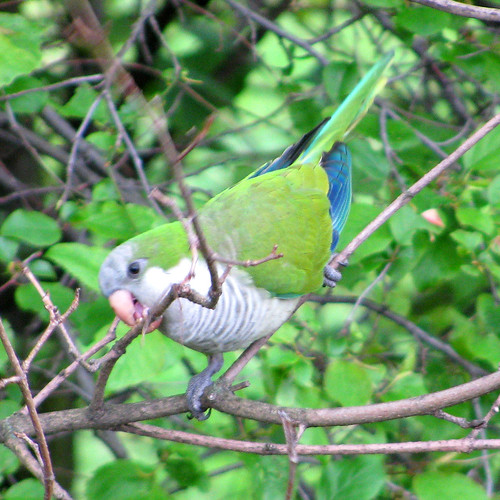 The Last of the London Monk parakeets?A species of parakeet that threatens wildlife and crops is to be removed from the wild, the government has said.
The Last of the London Monk parakeets?A species of parakeet that threatens wildlife and crops is to be removed from the wild, the government has said.
The Department for Environment, Food and Rural Affairs (Defra) said the monk parakeet, originally from South America, was an invasive species.
It announced control measures to either rehouse the birds, remove their nests, or - as a last resort - shoot them.
Defra estimates there are around 100 of the green-and-yellow birds in the UK, mainly in the south east of England.
Although the species had not yet caused any damage, Defra said they had the potential to threaten "national infrastructure".
It said extensive damage to crops had been reported in both North and South America, and the birds could cause power cuts when their nests were built on electricity pylons, particularly when they become wet from rain.
'Significant damage'
A Defra spokesman said it would try to rehouse the birds in aviaries and if that fails their nests would be moved.
"In extreme cases, it could mean we have to shoot some, but we haven't tried that yet," he said.
Unlike its relative, the ring-necked parakeet, which is already common in parts of the UK, the 1ft (30cm) tall monk parakeet builds huge communal nests.
The birds can be identified by their green body, yellowish belly, pale grey face and breast and pale bill, and they make raucous calls.
"Control work is being carried out as part of a Defra initiative to counter the potential threat monk parakeets pose to critical national infrastructure, crops and native British wildlife," a Defra spokesman said.
"This invasive species has caused significant damage in other countries through nesting and feeding activity and we are taking action now to prevent this happening in the UK."
A spokesman for the RSPB, the bird conservation group, said: "Our understanding is that they are going to be brought into captivity; we don't see it's necessary for them to be culled.
"We're happy action is taking place in that they're being removed from the wild.
"It's a small population at large, as the birds are colonial and are concentrated in one or two sites, so it will be possible to deal with as we think it could be a problem."
He said in Spain and the US there were now large populations that had caused problems, and praised Defra for taking "prudent" action.